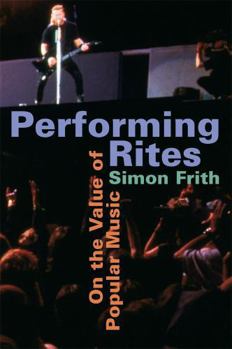Performing Rites: On the Value of Popular Music
Select Format
Select Condition 
Book Overview
Who's better? Billie Holiday or P. J. Harvey? Blur or Oasis? Dylan or Keats? And how many friendships have ridden on the answer? Such questions aren't merely the stuff of fanzines and idle talk; they inform our most passionate arguments, distill our most deeply held values, make meaning of our ever-changing culture. In Performing Rites, one of the most influential writers on popular music asks what we talk about when we talk about music...
Format:Paperback
Language:English
ISBN:0674661966
ISBN13:9780674661967
Release Date:February 1998
Publisher:Harvard University Press
Length:360 Pages
Weight:0.75 lbs.
Dimensions:0.9" x 6.1" x 9.4"
Customer Reviews
3 ratings
From Performers to Listeners and Everyone Else In to Music's Path
Published by Thriftbooks.com User , 15 years ago
I'm always amazed with writers who can produce a whole book out of philosophical contemplation, creating a winding path of questions, some answers, opinions, quotes, observations, study results, and random but relevant thoughts ultimately exploring cultural responses, consumption of, perceptions of value, aesthetics and social patterns related to music whether originating in Africa, Western popular or classical "art" music, ritualistic music, and beyond. Frith does offer some "bottom lines" such as the need to dissolve perceived approaches to the various types of music. He relies on extensive research and historical context to develop his views and there is plenty of credible "food for thought." Meanwhile, his writing style is very approachable, sincere, and carefully crafted. I'm not certain that the book title does its contents justice - there is so much more than the parameters of the title. All in all, a worthwhile and intriguing read!
Great book
Published by Thriftbooks.com User , 16 years ago
This is an excellent book for everyone who like music. Simon Frith style is clear and all parts are interested. The best part is that the author hates all kind of prejudice in music, and makes a very good debate about it. There is no "bad" music for him.
From "this sounds good" to "this is good."
Published by Thriftbooks.com User , 20 years ago
There is a lot to say about "Performing Rites," or rather there is a lot to say about the many different trajectories cameoed as this book progresses. It is a work that deliberately seeks to question rather than to answer, offering provocatively fertile and arguable points rather than a systemic totalizing argument. Keeping this in mind, the basic question Frith seeks out is: "Well, we know we make value judgments about popular music all the time. How and Why are these made?" That's a tall order. And Frith seeks to start from the listener's "common sense" perspective, but also incorporates production as well. Of course the first problem is the notion of "value" in cultural studies--where words like "good" and "bad" are either spoken from a condescending sneer, highly interrogated, or avoided altogether. Rather than seeing value for music in its "popularity," Frith contends that music is always already deeply woven into schemes of value--and that's why it becomes both popular and inherently political. Music has authors, intentions, narratives, and these cannot be separated from questions of value. Challenging capitalistic market measures of measuring both popularity and value (such as Billboard), Frith takes a cue from Kant, seeking to discover and refine the logic in 'common-sense' responses to music--from genre rules, to poltical distinctions between noise and sound. Frith treats rhythm at length, and challenges the notion that rhythm is 'inherently' tied to erotics, seeking instead historical and postcolonial explanations for this. Along the way, Frith demonstrates that much of the ninetheenth century cultural judgments and ideologies about music are still with us, albeit in mutated form. Folk, Art, and Pop are Frith's interwoven discourses about how music is perceived in Western Culture. "Folk" promises tradition, immediacy, and a critique of commercialism. "Art" promises mental and cultural transcendence. "Pop" promises access and portability. Songs are not mere texts or poetry--music gives sense and a frame for lyrics. Technology, Performance, and their meeting in the Microphoned Amplified Vocalists all play roles. Technology not only disseminates, but inseminates. Digital recordings and remasters do not uncover "the original object," but instead construct a new sound object according to changing cultural codes about music. Pop Performance involves constructing an image that gives the impression of truth and sincerity, but also offering seduction and danger as a lure. Vocalists DO play an instrument-- a microphone as well as a voice, and this alone has an enourmous impact on the meanings of music. All this leads Frith to argue that for the 'meaning of music.' Music means something because it offers not argumentation, but experience. For Frith, music constructs a "sense of identity" through the experiences it offers of time, sociability, and the body. Music makes possible a new-kind of self-recognition--one that through all these hist






